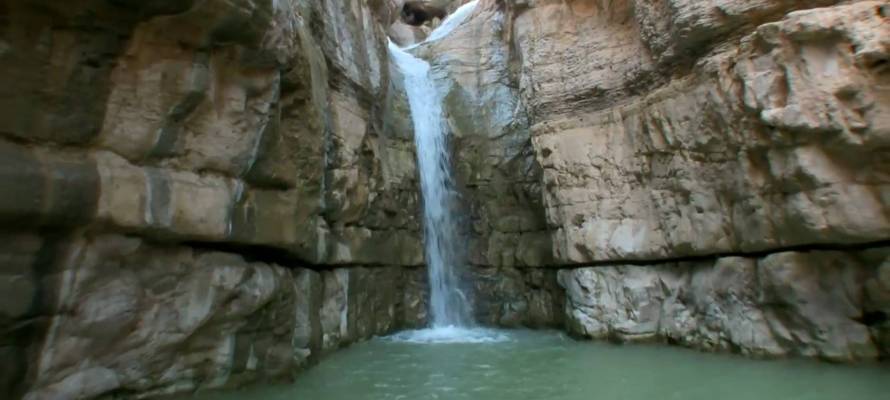Include Ein Gedi, a breathtaking oasis in the desert, in your next trip to Israel to explore many secrets, biblical sources and incredible wildlife and views.
The Dead Sea area is known for its healing properties, natural wonders, striking views, fascinating history, biblical episodes – and warm weather, which all make it a perfect wintertime destination. Ein Gedi is a one of the many remarkable places to hike for the whole day or stop for a quick visit in your travels in the area.
When King Saul feels his power is escaping him, he has (soon to be King) David (who was at the same time gaining power among the Jewish people) chased through several areas of the Land of Israel. Finally, David seeks refuge in Ein Gedi (literally, spring of the little goats) which is a beautiful oasis in the desert with waterfalls, ibexes (yaelim), and rock hyraxes (shafanei sela). David hides in a cave, and Saul happens to seek privacy next to that same cave in order to relieve himself discretely. David takes the opportunity to cut the corner of Saul’s coat without Saul realizing it. After, David shows Saul that he had cut his coat, and could have easily killed Saul if he had wanted to do so. Saul realizes what a remarkable person David is and declares, “You are more righteous than I, for you have repaid me with goodness, while I have repaid you with evil… And now, behold, I know that you will reign, and the kingdom of Israel will be established in your hand.”(1 Samuel 24:18-21)
Nevertheless, David feels badly about having caused cut the King’s garment and, according to Rabbinic commentaries, for having cut the part of his garment that had the tzitzit (fringes), which prevented Saul from observing the mitzvah (biblical commandment). The rabbis tell us that years later, when David was dying in Jerusalem and no garment could keep him warm, it was because of this incident.
Visitors enjoy recalling these powerful biblical moments in the same spectacular setting that existed 3,000 years ago!
In modern times, the ibexes were at risk of becoming extinct in Israel, and it was decided to set aside Ein Gedi as a nature reserve to protect the precious wildlife there. As a result, the adorable ibex became the symbol of Israel’s Nature and Parks Authority.
If you visit Ein Gedi, be sure to stop at the ancient synagogue. Its beautiful 5th-6th–century mosaic floor has incredible inscriptions. Amazingly, as can be seen in many sites throughout Israel, the donors’ names are still written in the mosaic! The inscription also warns of a curse on those who reveal the town’s secret.
What is this secret? Researchers generally agree that it’s the method for producing perfume from the balsam shrub that grew in the area. This perfume/oil, called Shemen Afarsimon (persimmon oil), was as valuable as gold. In addition to its incredible aroma, it was special because the oil had been used by Samuel the Prophet for anointing King Saul, and resin from this tree was used for one of the ingredients called Tzri (balsam) in the Ketoret (incense in the Holy Temple in Jerusalem). According to Jewish tradition, the balsam shrub grew only in the Land of Israel as long as the Temple stood in Jerusalem. In those years, other kings tried to grow the shrub in their countries, but were unsuccessful. Cleopatra of Egypt always wanted to take control of this area because of the persimmon oil and the many other valuable resources there.
A jar of oil that seems to be this same oil was discovered by Noahide archaeologist Vendyl Jones (who passed away on December 27, 2010) in 1988.
By: Leah Bowman
(The author, a licensed tour guide, leads inspiring tours throughout Israel, including child-friendly and bible tours. Check out her website and blog page.)
